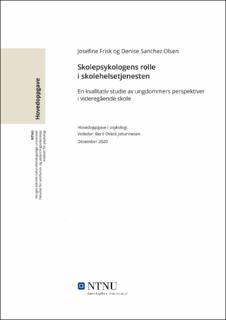| dc.contributor.advisor | Johannesen, Berit Overå | |
| dc.contributor.author | Frisk, Josefine | |
| dc.contributor.author | Olsen, Denise Sanchez | |
| dc.date.accessioned | 2021-09-13T16:19:52Z | |
| dc.date.available | 2021-09-13T16:19:52Z | |
| dc.date.issued | 2020 | |
| dc.identifier | no.ntnu:inspera:65731347:10001095 | |
| dc.identifier.uri | https://hdl.handle.net/11250/2776094 | |
| dc.description.abstract | Det rapporteres om en stadig forverring av ungdommers psykiske helse (Bakken, 2019), og som følge av kommunepsykologsatsningen har psykologers rolle i videregående skole blitt ytterligere aktualisert (Meld. St. 26 (2014-2015)). Denne hovedoppgaven har som formål å undersøke ungdommer i videregående skole sine perspektiver på skolepsykologen i skolehelsetjenesten. Det er få studier i Norge som har undersøkt dette. Oppgaven vil forsøke å besvare følgende problemstillinger: Hvilke oppfatninger om og ønsker til skolepsykologen har ungdommer i videregående skole? Hvordan kan kunnskap om ungdommenes oppfatninger og ønsker bidra i utformingen av skolepsykologens rolle? Vi gjennomførte 6 fokusgruppeintervjuer ved to ulike, norske videregående skoler. Det deltok totalt 32 ungdommer fra VG1 til VG3. Vi analyserte dataene ved å ta i bruk tematisk analyse. I studien fant vi tre hovedtemaer: «Skolepsykologens ettertraktede kompetanse», «Oppfatninger som påvirker oppsøking av skolepsykolog» og «Tilgjengelighet som forutsetning for skolepsykologens arbeid». Funnene belyser at ungdommene har et ønske om psykologkompetanse i skolen, både i form av undervisning om ungdomsrelevante temaer og i form av individuelle samtaler ved behov. Det ble samtidig identifisert barrierer for ungdommenes oppsøking av skolepsykologen. De viktigste barrierene var stigma knyttet til psykiske helseplager og hjelpsøking, samt opplevelsen av skolepsykologens utilgjengelighet. I oppgaven gir vi forslag til hvordan skolepsykologens rolle kan utformes for å overkomme og bryte ned disse barrierene. Skolepsykologens rolle bør bestå av både undervisning og behandling. Undervisningen bør være rettet mot å fremme psykisk helsefremmende kompetanse, med et særskilt fokus på sosial fungering. Behandlingen bør være en mulighet for ungdommer med psykiske helseplager og betydelig redusert livskvalitet. Behandling av psykiske lidelser virker ikke forenelig med skolehelsetjenestens nåværende ressurser og ungdommenes sentrale ønske om tilgjengelighet. I oppgaven har vi også belyst hvordan skolepsykologen må ta høyde for potensielle negative konsekvenser, som rollen kan medføre i møte med ungdommene. Vi argumenterer for at skolepsykologen bør fremstille psykologisk kompetanse på en slik måte at psykologen som en «ekspertskikkelse» avmystifiseres. Dette kan videre gjøre at implementeringen av skolepsykologen i skolehelsetjenesten ikke fører til en økt sykeliggjøring av livets utfordringer eller avhengighet til profesjonell hjelp. | |
| dc.description.abstract | There has been reported a steady deterioration in adolescents’ mental health (Bakken, 2019), and as a result of the municipal psychologist initiative, the role of psychologists in upper secondary school has become increasingly relevant (Meld. St. 26 (2014-2015)). The purpose of this thesis is to examine adolescents in upper secondary school and their perspectives on the school psychologist in the school health service. There are few studies in Norway that have examined adolescents’ perspectives on the school health service. The thesis will seek to answer the following questions: How do adolescents in upper secondary school perceive the school psychologist, and what wishes do they have? How can knowledge about adolescents’ perceptions and wishes contribute to the shaping of the role of the school psychologist? We conducted 6 focus group interviews at two different Norwegian upper secondary schools. A total of 32 adolescents from each grade of upper secondary school participated. We analyzed the data using thematic analysis. Through the analysis, three main themes were identified, each with associated sub-themes. The main themes are defined as «The school psychologist's desired competence», «Perceptions that influenced help-seeking from the school psychologist» and «Accessibility as a prerequisite for the school psychologist's work». The findings shed light on the fact that the adolescents have a desire for psychological competence in school, both in the form of teaching about youth-relevant topics and in the form of individual consultations when needed. However, barriers were identified to the adolescents’ help-seeking. The most important barriers were the stigma associated with mental health problems and seeking help, as well as the experience of the school psychologist's inaccessibility. In this thesis, suggestions are made for how the school psychologist's role can be designed to overcome and break down these barriers. The role of the school psychologist should consist of both teaching and treatment. The teaching should be aimed at promoting mental health literacy, with a special focus on social functioning. The treatment should be an opportunity for adolescents with mental health problems and significantly reduced quality of life. Treatment of mental disorders does not seem compatible with the school health service's current resources and adolescents’ fundamental desire for accessibility. In the thesis, we have also highlighted how the school psychologist must take into account potential negative consequences, which the role may entail in encounters with the adolescents. We argue that the school psychologist should present psychological competence in such a way that the psychologist as an "expert figure" is demystified. Taking this into account the implementation of the school psychologist in the school health service can avoid an increased understanding of life's challenges as signs of mental illness and the adolescents’ dependence on professional help. | |
| dc.language | | |
| dc.publisher | NTNU | |
| dc.title | Skolepsykologens rolle i skolehelsetjenesten: En kvalitativ studie av ungdommers perspektiver i videregående skole | |
| dc.type | Master thesis | |
